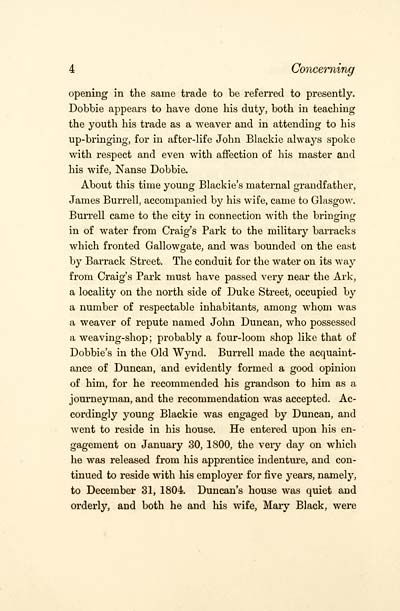Download files
Complete book:
Individual page:
Thumbnail gallery: Grid view | List view

4 Concerning
opening in the same trade to be referred to presently.
Dobbie appears to have done his duty, both in teaching
the youth his trade as a weaver and in attending to his
up-bringing, for in after-life John Blackie always spoke
with respect and even with affection of his master and
his wife, Nanse Dobbie.
About this time young Black ie's maternal grandfather,
James Burrell, accompanied by his wife, came to Glasgow.
Burrell came to the city in connection with the bringing
in of water from Craig's Park to the military barracks
which fronted Gallowgate, and was bounded on the east
by Barrack Street. The conduit for the water on its way
from Craig's Park must have passed very near the Ark,
a locality on the north side of Duke Street, occupied by
a number of respectable inhabitants, among whom was
a weaver of repute named John Duncan, who possessed
a weaving-shop; probably a four-loom shop like that of
Dobbie's in the Old Wynd. Burrell made the acquaint-
ance of Duncan, and evidently formed a good opinion
of him, for he recommended his grandson to him as a
journeyman, and the recommendation was accepted. Ac-
cordingly young Blackie was engaged by Duncan, and
went to reside in his house. He entered upon his en-
gagement on January 30, 1800, the very day on which
he was released from his apprentice indenture, and con-
tinued to reside with his employer for five years, namely,
to December 31, 1804. Duncan's house was quiet and
orderly, and both he and his wife, Mary Black, were
opening in the same trade to be referred to presently.
Dobbie appears to have done his duty, both in teaching
the youth his trade as a weaver and in attending to his
up-bringing, for in after-life John Blackie always spoke
with respect and even with affection of his master and
his wife, Nanse Dobbie.
About this time young Black ie's maternal grandfather,
James Burrell, accompanied by his wife, came to Glasgow.
Burrell came to the city in connection with the bringing
in of water from Craig's Park to the military barracks
which fronted Gallowgate, and was bounded on the east
by Barrack Street. The conduit for the water on its way
from Craig's Park must have passed very near the Ark,
a locality on the north side of Duke Street, occupied by
a number of respectable inhabitants, among whom was
a weaver of repute named John Duncan, who possessed
a weaving-shop; probably a four-loom shop like that of
Dobbie's in the Old Wynd. Burrell made the acquaint-
ance of Duncan, and evidently formed a good opinion
of him, for he recommended his grandson to him as a
journeyman, and the recommendation was accepted. Ac-
cordingly young Blackie was engaged by Duncan, and
went to reside in his house. He entered upon his en-
gagement on January 30, 1800, the very day on which
he was released from his apprentice indenture, and con-
tinued to reside with his employer for five years, namely,
to December 31, 1804. Duncan's house was quiet and
orderly, and both he and his wife, Mary Black, were
Set display mode to:
![]() Universal Viewer |
Universal Viewer | ![]() Mirador |
Large image | Transcription
Mirador |
Large image | Transcription
Images and transcriptions on this page, including medium image downloads, may be used under the Creative Commons Attribution 4.0 International Licence unless otherwise stated. ![]()
| Histories of Scottish families > Sketch of the origin and progress of the firm of Blackie & Son, Publishers, Glasgow, from its foundation in 1809 to the decease of its founder in 1874 > (18) |
|---|
| Permanent URL | https://digital.nls.uk/95489593 |
|---|
| Description | A selection of almost 400 printed items relating to the history of Scottish families, mostly dating from the 19th and early 20th centuries. Includes memoirs, genealogies and clan histories, with a few produced by emigrant families. The earliest family history goes back to AD 916. |
|---|

